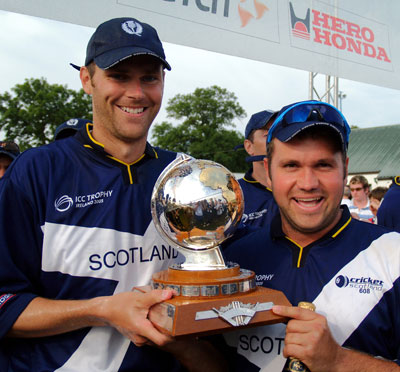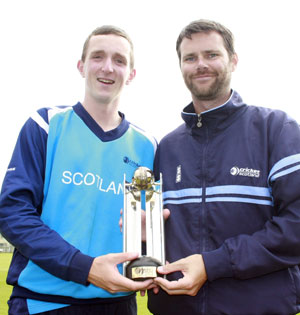 Craig Wright enjoyed many memorable afternoons in his country's cause, whether participating in the 2007 World Cup in the Caribbean or leading Scotland to all-conquering success at the ICC Trophy in Ireland two years earlier.
Craig Wright enjoyed many memorable afternoons in his country's cause, whether participating in the 2007 World Cup in the Caribbean or leading Scotland to all-conquering success at the ICC Trophy in Ireland two years earlier.
But there were few occasions where everything came together to such spell-binding effect as when the teenage pace bowler stamped his imprint all over the proceedings when George Salmond's side tackled Worcestershire at The Grange in the summer of 1998.
In these days, the Scots were genuinely part-time players and their ranks featured none of the big-name luminaries such as Gordon Greenidge and Clive Rice, who had turned out in previous campaigns, without making a habit of hitting the heights.
Yet, as Wright recalled this week, fresh from conducting a net session in glorious conditions with his country's leading under-19 talent, there was no inferiority complex among the Scots who marched into battle against English opponents, packed with international stars.
"It was only my fifth or sixth game for Scotland, but there was a real buzz around that team, and lots of competition for places, and we were pretty confident that we could give anybody a decent match if we performed to our potential," said Wright.
"In the B & H
Cup that same season, we did quite well, and we could have won a couple of the fixtures against Derbyshire and Leicestershire, so we certainly backed ourselves. We had also played Worcester in the competition, down at New Road, and they absolutely hammered us, but that simply made us doubly determined when they arrived in Edinburgh. They were a good side, no doubt about it. But in one-day cricket, anything can happen."
The Scots batted first, in conditions which offered the prospect of a fair contest and, inspired by the usual mixture of the committed defence and classy shots from their redoubtable Ayr opener, Bruce Patterson, and the fluent striking of Mike Allingham, the hosts set about posting a decent target for their rivals.
 That pair added 118 for the second wicket, their progress more solid than spectacular, and yet the runs mounted up before Allingham parted for 54 and Patterson followed him for 71. On other days, the middle order might have subsided, but, in this instance, they contributed precious runs through George Salmond (27), Drew Parsons (30) and Ian Stanger (23 not out) and by the time the innings was completed, they had advanced to 244 for 6 from their 60 overs.
That pair added 118 for the second wicket, their progress more solid than spectacular, and yet the runs mounted up before Allingham parted for 54 and Patterson followed him for 71. On other days, the middle order might have subsided, but, in this instance, they contributed precious runs through George Salmond (27), Drew Parsons (30) and Ian Stanger (23 not out) and by the time the innings was completed, they had advanced to 244 for 6 from their 60 overs.
"It doesn't sound much nowadays, when you are considered to have only made a par score if you get to 240 from 40 overs, but we were fairly happy with it at the midway stage," recalled Wright.
"We knew we had to bowl and field to our best. But we also realised that there was something in the pitch for the bowlers if you landed it in the right place."
Wright is one of the sport's cerebral individuals, and still believes that he and Scotland's cause was bolstered by a rain shower, which briefly halted the action when Worcester started their reply. Yet, irrespective of what assistance he might or might not have gained from the elements, nothing should detract from the scintillating burst which Wright produced to plunge the visitors into trouble, from the heights of 65 for 1, with Abdul Hafeez and Graham Hick both looking settled at the crease.
Suddenly, as he discovered his rhythm, his professional opponents were left looking like novices, while the Scot extracted swing and seam movement and sparked a dramatic collapse. In the space of a few overs, Hafeez was gone, then Hick exited the middle, swiftly followed by Australian Test star, Tom Moody, the future England international, Vikram Solanki, and David Leatherdale and Worcester had subsided to 98 for 6.
Almost incredibly, Wright's analysis added up to 12 overs, five maidens, five for 23, which was the stuff of dreams for the underdogs. Yet, even then, Wright knew that they could take nothing for granted.
"The counties were accustomed to digging themselves out of these situations, and they usually had plenty of depth in their batting, so we knew that, sooner or later, somebody would steady the ship and, this time, it was Stuart Lampitt and Gavin Haynes – who were good players, even though they weren't the most high-profile guys in their team – who almost completed a remarkable recovery," said Wright.
"We tried our hardest to keep things tight, and remain positive, and the run rate kept increasing, but once they had taken the score past 200, it was maybe understandable that you could see one or two of us thinking: "Sh**, here we go again!"
At that stage, it definitely wasn't a level playing field between the county sides and the likes of Scotland – they were playing day in, day out, and it was their careers, whereas our lads had day jobs and we had to fit in our cricket wherever we could – but this was one match where things went right."
 With Wright out of the attack, the onus was on the other bowlers to finish his fine work. And, to their credit, doughty warriors such as Greig Williamson, Allingham, [the current Scotland coach] Pete Steindl and the late Asim Butt, all chipped in with flinty spells and different sorts of crucial contributions.
With Wright out of the attack, the onus was on the other bowlers to finish his fine work. And, to their credit, doughty warriors such as Greig Williamson, Allingham, [the current Scotland coach] Pete Steindl and the late Asim Butt, all chipped in with flinty spells and different sorts of crucial contributions.
Williamson removed the dangerous Lampitt, clean bowled for 54, and Allingham dismissed Haynes in similar style for 79 as the crowd at the sun-drenched Edinburgh arena dared to dream, whilst privately fearing another case of the Scots snatching defeat from the jaws of victory.
But, undaunted by the pressure, Williamson stepped forward to bowl the final over - as his coach, Jim Love, put it, with typical Yorkshire bluntness: "It was one of the situations where you are going to be a hero or an a**e, - and had the former England wicket-keeper, Steve Rhodes, caught by Butt, to ensure there was no last-gasp redemption for Worcester.
The Scots had prevailed – by a mere four runs – and the exultation around the ground told its own story.
Much of that spirit and resolve was in evidence the following year when Salmond and his troops engaged in their maiden World Cup joust, without – ridiculous as it now appears – the inclusion of Wright in the squad.
But, at this distance, the player isn't inclined to dwell on what might have been. "We were involved in a lot of matches where we came close and then somebody would emerge from the county sides to dash our hopes and we just had to regard it all as part of a learning process," said Wright.
"But, looking back, it just made the occasions such as when we beat Worcester all the sweeter. And I don't think anybody who watched the match would deny that we deserved our victory."
 Craig Wright enjoyed many memorable afternoons in his country's cause, whether participating in the 2007 World Cup in the Caribbean or leading Scotland to all-conquering success at the ICC Trophy in Ireland two years earlier.
Craig Wright enjoyed many memorable afternoons in his country's cause, whether participating in the 2007 World Cup in the Caribbean or leading Scotland to all-conquering success at the ICC Trophy in Ireland two years earlier.  That pair added 118 for the second wicket, their progress more solid than spectacular, and yet the runs mounted up before Allingham parted for 54 and Patterson followed him for 71. On other days, the middle order might have subsided, but, in this instance, they contributed precious runs through George Salmond (27), Drew Parsons (30) and Ian Stanger (23 not out) and by the time the innings was completed, they had advanced to 244 for 6 from their 60 overs.
That pair added 118 for the second wicket, their progress more solid than spectacular, and yet the runs mounted up before Allingham parted for 54 and Patterson followed him for 71. On other days, the middle order might have subsided, but, in this instance, they contributed precious runs through George Salmond (27), Drew Parsons (30) and Ian Stanger (23 not out) and by the time the innings was completed, they had advanced to 244 for 6 from their 60 overs.  With Wright out of the attack, the onus was on the other bowlers to finish his fine work. And, to their credit, doughty warriors such as Greig Williamson, Allingham, [the current Scotland coach] Pete Steindl and the late Asim Butt, all chipped in with flinty spells and different sorts of crucial contributions.
With Wright out of the attack, the onus was on the other bowlers to finish his fine work. And, to their credit, doughty warriors such as Greig Williamson, Allingham, [the current Scotland coach] Pete Steindl and the late Asim Butt, all chipped in with flinty spells and different sorts of crucial contributions.